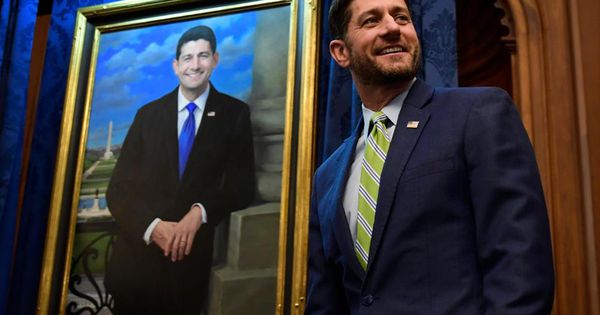
House Speaker Paul Ryan of Wis., watches as his portrait is unveiled on Capitol Hill in Washington, Thursday, Nov. 29, 2018. (AP Photo/Susan Walsh)
Democrats’ 2010 health care bill was called the “Affordable Care Act.” But for hundreds of millions of Americans, premiums have risen even further because of Obamacare’s tax on insurance premiums. Congress has an opportunity to repeal this tax before members head home for the holidays.
Taxing health insurance premiums is completely counterproductive
President Obama insisted that his health care bill not increase the federal deficit. And, indeed, the Patient Protection and Affordable Care Act was scored by the Congressional Budget Office as not increasing the deficit, because it funded its $ 2 trillion in funding for insurance subsidies with large cuts to Medicare and a battery of tax increases.
Major fiscal components of the Affordable Care Act (in billions), as projected by the Congressional Budget Office.Avik Roy
Many of those tax increases harmed economic growth in the Obama years, especially the 3.8 percent net investment income tax, which the Tax Foundation estimates as costing 133,000 jobs and restraining wage growth.
But the blue ribbon for the Dumbest Tax in Obamacare goes to its tax on health insurance premiums, which the Joint Committee on Taxation estimates as raising $ 161 billion in revenue between 2019 and 2028. (The number would be higher, but for the fact that Congress passed a one-year premium tax holiday for 2019.)
The problem is this: Health insurers aren’t in the business of going broke. So they pass along the cost of the tax in the form of higher premiums for consumers. According to estimates developed by consultants at Oliver Wyman, for every dollar Washington raises in taxes, premiums go up by around $ 1.27.
That translates to an annual premium increase in 2020 of $ 196 per person for those buying coverage through Obamacare; $ 458-479 for individuals obtaining coverage through their employers; $ 241 for enrollees in Medicare Advantage; and $ 147 for enrollees in Medicaid managed care plans.
HIT revenue is offset by adverse selection and higher spending on premium subsidies
Ok, so it’s bad enough that health insurance premiums will go up due to the Obamacare premium tax. But it gets worse.
First, as health insurance gets more expensive due to the tax, more healthy people drop out of the insurance market. If you aren’t sick, the likelihood that you’ll buy insurance decreases as the price of insurance goes up. And as more healthy people drop out, premiums increase for the sicker people who remain.
Second, the federal government subsidizes the cost of health insurance for nearly every American. Premiums in Medicaid are paid by federal and state governments. Premiums in Medicare Advantage are heavily subsidized by federal funds. Same for Obamacare. And even employer-sponsored insurance is heavily subsidized through the tax code.
So think about how boneheaded this is. The federal government imposes a tax on health insurance premiums. That tax leads to even higher premiums. Higher premiums lead to higher levels of subsidies of premiums by the government.
Additional premiums due to the Affordable Care Act’s health insurance premium tax.Oliver Wyman
For example, the Oliver Wyman authors believe that the premium tax will result in $ 58 billion in additional spending on Medicaid premiums between 2020 and 2029. Premiums will rise $ 72 billion in Medicare Advantage, $ 103 billion for employer-sponsored coverage, $ 29 billion for individual-market coverage, $ 4.7 billion for Medicare drug plans, and $ 3.8 billion for federal employees.
That’s a total of $ 211 billion in premium hikes over ten years. Which means that the fiscal benefit of this $ 161 billion tax is far outweighed by its fiscal and policy costs.
The lame duck opportunity
Between the November 2018 election and the installation of the new Congress in January, Congress is in what’s called a “lame duck” session.
It’s a perfect opportunity for Republicans to repeal a tax that would result in lower premiums for hundreds of millions of Americans and reduced federal spending to boot. State governments would benefit, too, as the premium tax raises their costs for administering Medicaid managed-care plans.
They could even call it “The More Affordable Care Act.”
* * *
FOLLOW @Avik on Twitter, Google+, and YouTube, and The Apothecary on Facebook. Or, sign up to receive a weekly e-mail digest of articles from The Apothecary. Read Transcending Obamacare, Avik’s plan to replace Obamacare, at FREOPP.org.
INVESTORS’ NOTE: The biggest publicly-traded health insurance companies include UnitedHealth (NYSE:UNH), Anthem (NYSE:ANTM), Humana (NYSE:HUM), Molina (NYSE:MOH), and Centene (NYSE:CNC).
